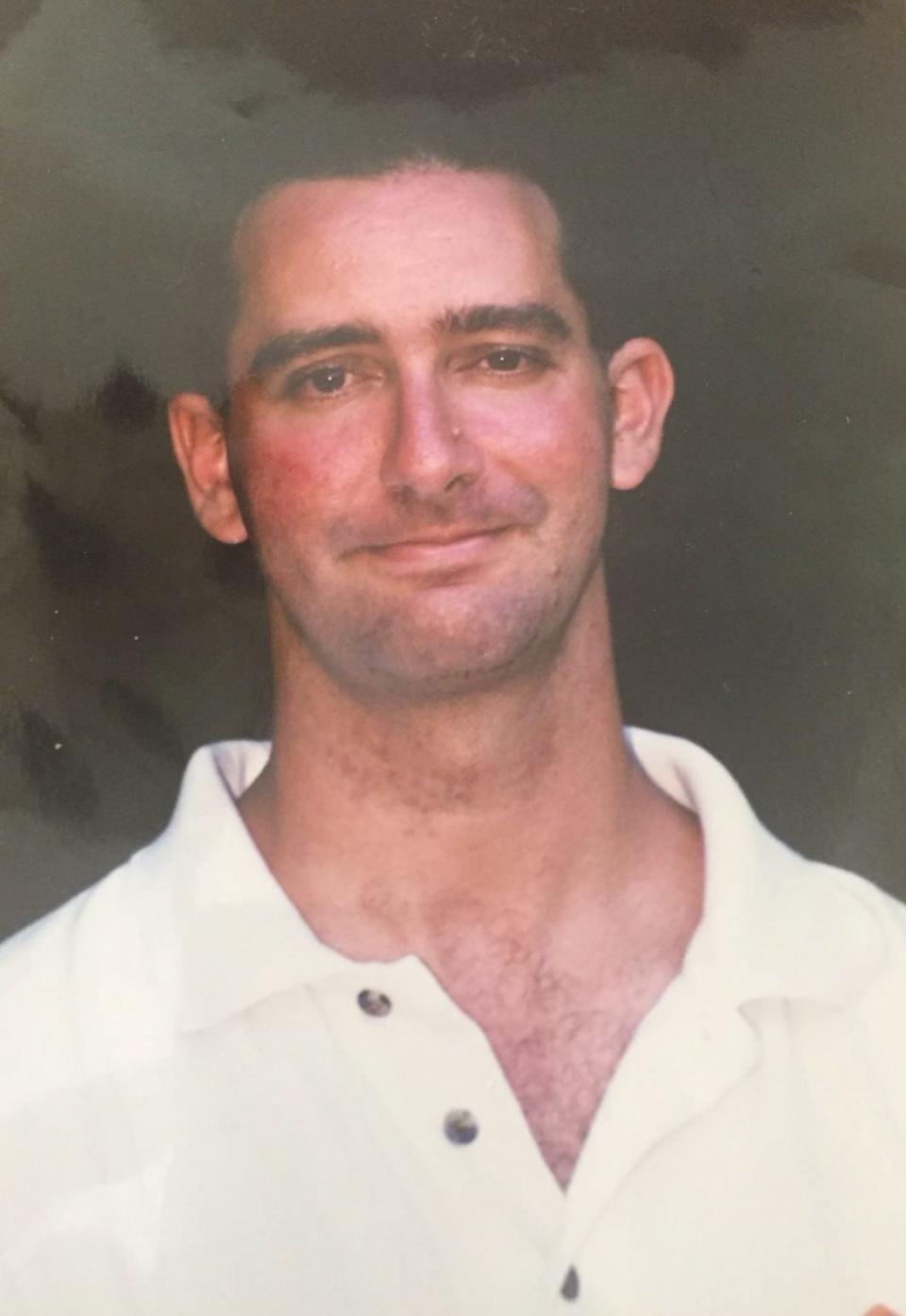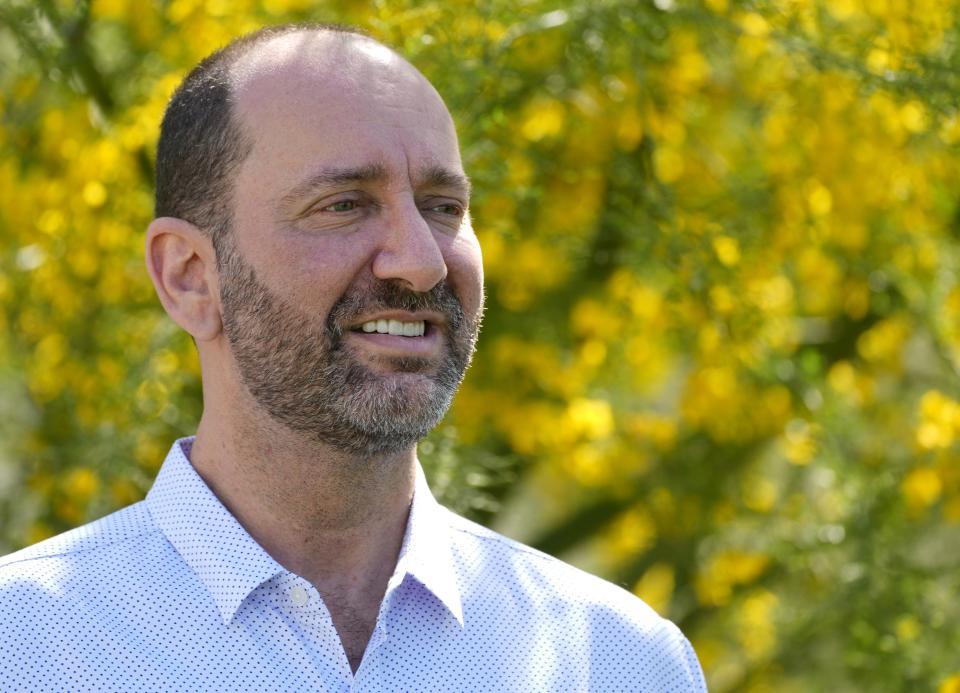How Phoenix author Bill Konigsberg uses his voice to help LGBTQ teens see themselves
- Oops!Something went wrong.Please try again later.
It took the author Bill Konigsberg about 5 minutes to make one of the biggest decisions of his life.
It was 2001, and Konigsberg was working as an editor at ESPN.
"It was really like working at a frat house," he said. "I mean, it was just all boys, all dudes, all the time."
There were parts of it he liked and parts he didn't. And he had a secret, one he worried that, if it ever got out, would kill his career in sports journalism.
He had entered the field seven years earlier in an unconventional way. The 1994 baseball strike was looming, and Konigsberg, a self-proclaimed nerd of the sport, had been simulating games on a computer.
He called the sports desk at the New York Daily News, told them he was a freelance journalist — he was actually just unemployed — and offered to simulate the rest of the season, writing articles as if the games had really happened.
They took him up on the offer. And then they sold it to the Miami Herald and the San Francisco Chronicle.
"And suddenly I was on TV. Dateline NBC, World News Tonight, were covering what I was doing," Konigsberg said.
The wildly successful freelance gig landed him a reporter job in New Jersey, but it wasn't a good fit.
"I was a terrible journalist. I did not care," Konigsberg said. "They would send me out to do things like cover this parade and I would drive by it to make sure that nothing bad was happening." Then he'd settle in at a coffee shop and write a story with whatever came to mind.

If he was going to be in journalism, he wanted to be in sports journalism. And in the late 1990s, he got a foot in the door at ESPN.
That's where he was in 2001 as a rumor circulated that a Major League Baseball player was planning to come out as gay. People were sounding off about it left, right and center.
"And I realized that I wasn't using my voice," Konigsberg said. "So I very, very quickly, without even thinking about the ramifications, I sat down and in about five minutes I wrote an essay. The essay was called 'Sports World Still a Struggle for Gays.'"
"And that's how I came out."
A helping hand: This pastor came to the US from Chile. Now she helps asylum-seekers
A childhood dream, interrupted
Growing up in New York City, Konigsberg had always wanted to be an author. He was a creative kid who loved writing stories, a passion he took all the way to Columbia University.
"I remember a teacher of mine saying, 'You know, you can't make money as an author,'" Konigsberg said. "And of course, that's all I wanted to do."
But he took the advice to heart, and set about finding a different career, one where he could write and make a living at the same time. That's how he landed in sports journalism, which appeared to marry his dual loves of writing and baseball.
But it wasn't a perfect match.
Konigsberg had realized he was gay when he was a teenager in the 1980s, as the AIDS crisis swept NYC. It was a traumatic time to come out, he said, the "white hot" period of his life.
He felt uneasy about how he would fare in the sports world as a gay man.
"I thought it was very likely that I would not be able to work in sports if I came out," he said.
But he was wrong.
His essay was met with support, both from his editor and from readers, who sent emails and letters. It won him a GLAAD Media Award in 2002, and led to him speaking around the country about covering gay issues in sports.
His greatest fear had instead brought success. But he had never quite let go of his dream of becoming a novelist.
So in 2002, he picked up and moved across the country to pursue a Master of Fine Arts in creative writing at Arizona State University.
A lifetime of high points: Hiker Robert Packard looks back on his career
'It was the book that I needed to write'
Konigsberg didn't set out to become a young adult fiction author. It just happened that way.
When he began to write his first novel in 2003, still in the program at ASU, he said he wasn't aware young adult — YA in the industry — was a genre.
"When I was a kid, we didn't talk about young adult fiction," he said.
But as he wrote, he found himself defaulting to a teenage voice to match his protagonist, his mind gravitating back to his rocky adolescence in the 1980s.
The resulting book, a coming-out story about a gay footballer titled "Out of the Pocket," was published by Penguin in 2008. It won a Lambda Literary Award the following year.
"It was the book that I needed to write," Konigsberg said. "But I think I also began to realize that, 'Oh, I could really make a difference.'"
He sold a second novel to Penguin, but negotiations broke down and the contract was canceled.
"I was devastated," he said. "I thought my career was over."
He didn't give up on the book, continuing to work on it and craft it into the story he wanted to tell.
In 2013, "Openly Straight" was published by Arthur A. Levine Books. It has since sold in the vicinity of 200,000 copies, the most successful of Konigsberg's seven titles.
It spawned a sequel and interest from Hollywood too; Konigsberg is currently working as creator and co-writer on a potential TV show.
He published a third book in 2015, and then four more, all the way up to his most recent, "Destination Unknown," in 2022.
Along the way, he became a well-known author in the rapidly evolving world of LGBTQ young adult fiction.
"Which was very wonderful and gratifying," Konigsberg said. "And I'd get all of these lovely emails and hear from kids all the time."
Do you have an inspiring neighbor, colleague or friend you think should be featured in Faces of Arizona? Let us know by filling out this form.
Caught in a new backlash
These days, Konigsberg lives in central Phoenix with his husband, whom he met when he first moved to Arizona.
"I knew nothing about Arizona," he said, "and it's become my home."
Konigsberg initially moved back to New York after finishing the ASU program, and then, briefly, to Montana. But he found his place in Phoenix.
He's not really a desert person, Konigsberg said, but there's just something about Phoenix: the vibe, the people, the speed.
"Easily the place I've been happiest in my life by a mile," Konigsberg said. "I think I'm just a Western person who was born on the east coast."

One of his seven books is set in Arizona.
His fifth novel, "The Music Of What Happens," tells the story of two boys who fall in love over the course of a summer working at a food truck in Mesa.
In January, the novel became the subject of controversy in a California school district after a parent complained her 7-year-old could access the audiobook via a library app.
Konigsberg agrees the book isn't suitable for that age group. It was written for older teenagers. But the incident soon ballooned out of control.
After the board suspended the library app in response, the story made its way to Fox News and other websites, and Konigsberg began to receive hateful emails and messages.
He was no stranger to this kind of backlash. His novels had appeared on various lists of banned or targeted books and in 2022 he wrote an open letter to a couple seeking to ban 282 books, including one of Konigsberg's, from their local school library.
But the January incident, the vicious tenor of the messages slung his way, deeply affected him. He was labeled a pedophile and a groomer, names that Konigsberg said he found traumatic to hear because he was himself groomed as a teenager.
He came down with shingles amid the extreme stress.
"I couldn't write for a while," he said. "I found myself just angry, with nowhere to put the anger."
A growing, and evolving, genre
Months later, Konigsberg is trying to shake it off, focusing on his family and taking care of his body, reminding himself that he's a person who is trying to do good in the world.
There's some evidence of that in his inbox, emails from kids telling him that his books changed or even saved their lives.
And despite the current backlash, he believes the genre of LGBTQ young adult fiction has grown and changed for the better.
Over the past 15 years, Konigsberg has witnessed a rapid evolution in the once-niche category.
"At first it was, we need to write coming-out stories. Then it was, now we need to write stories that aren't just about coming out," he said. "And then finally, 10 years later, it's about stories in which it doesn't matter that the characters are gay."
"And now it's, of course, every possible identity, and the more the better. And I think that's wonderful."
This article originally appeared on Arizona Republic: How Phoenix author Bill Konigsberg helps LGBTQ teens see themselves

